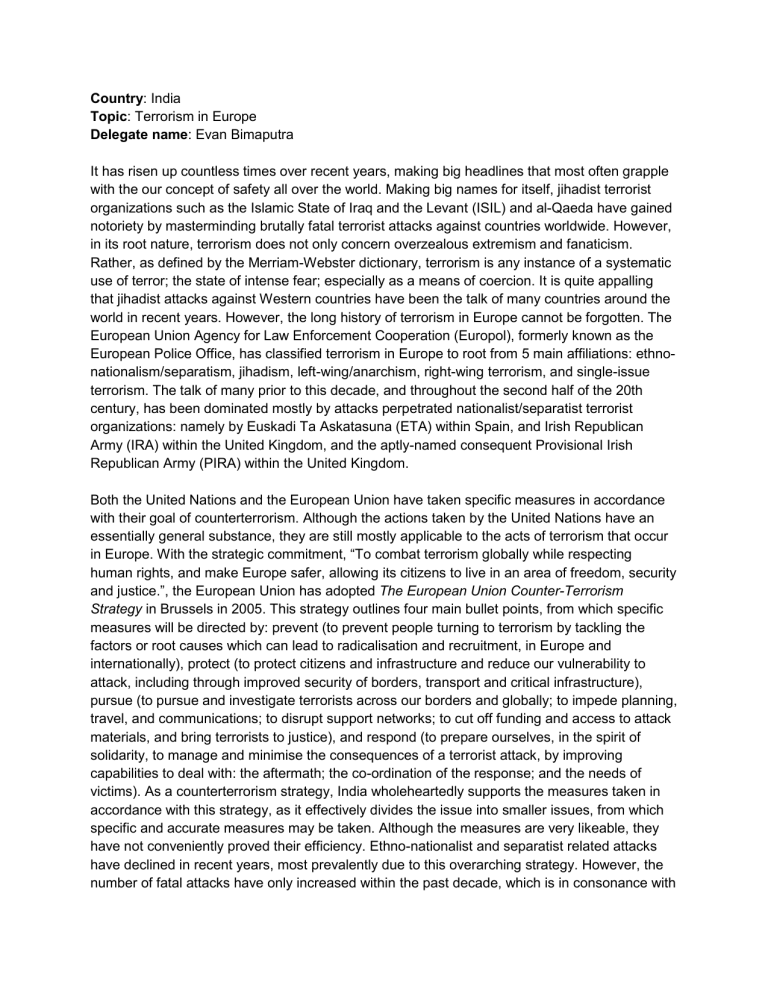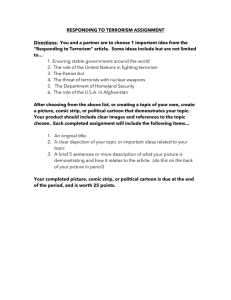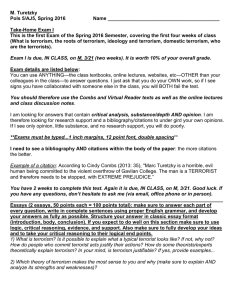
Country: India Topic: Terrorism in Europe Delegate name: Evan Bimaputra It has risen up countless times over recent years, making big headlines that most often grapple with the our concept of safety all over the world. Making big names for itself, jihadist terrorist organizations such as the Islamic State of Iraq and the Levant (ISIL) and al-Qaeda have gained notoriety by masterminding brutally fatal terrorist attacks against countries worldwide. However, in its root nature, terrorism does not only concern overzealous extremism and fanaticism. Rather, as defined by the Merriam-Webster dictionary, terrorism is any instance of a systematic use of terror; the state of intense fear; especially as a means of coercion. It is quite appalling that jihadist attacks against Western countries have been the talk of many countries around the world in recent years. However, the long history of terrorism in Europe cannot be forgotten. The European Union Agency for Law Enforcement Cooperation (Europol), formerly known as the European Police Office, has classified terrorism in Europe to root from 5 main affiliations: ethnonationalism/separatism, jihadism, left-wing/anarchism, right-wing terrorism, and single-issue terrorism. The talk of many prior to this decade, and throughout the second half of the 20th century, has been dominated mostly by attacks perpetrated nationalist/separatist terrorist organizations: namely by Euskadi Ta Askatasuna (ETA) within Spain, and Irish Republican Army (IRA) within the United Kingdom, and the aptly-named consequent Provisional Irish Republican Army (PIRA) within the United Kingdom. Both the United Nations and the European Union have taken specific measures in accordance with their goal of counterterrorism. Although the actions taken by the United Nations have an essentially general substance, they are still mostly applicable to the acts of terrorism that occur in Europe. With the strategic commitment, “To combat terrorism globally while respecting human rights, and make Europe safer, allowing its citizens to live in an area of freedom, security and justice.”, the European Union has adopted The European Union Counter-Terrorism Strategy in Brussels in 2005. This strategy outlines four main bullet points, from which specific measures will be directed by: prevent (to prevent people turning to terrorism by tackling the factors or root causes which can lead to radicalisation and recruitment, in Europe and internationally), protect (to protect citizens and infrastructure and reduce our vulnerability to attack, including through improved security of borders, transport and critical infrastructure), pursue (to pursue and investigate terrorists across our borders and globally; to impede planning, travel, and communications; to disrupt support networks; to cut off funding and access to attack materials, and bring terrorists to justice), and respond (to prepare ourselves, in the spirit of solidarity, to manage and minimise the consequences of a terrorist attack, by improving capabilities to deal with: the aftermath; the co-ordination of the response; and the needs of victims). As a counterterrorism strategy, India wholeheartedly supports the measures taken in accordance with this strategy, as it effectively divides the issue into smaller issues, from which specific and accurate measures may be taken. Although the measures are very likeable, they have not conveniently proved their efficiency. Ethno-nationalist and separatist related attacks have declined in recent years, most prevalently due to this overarching strategy. However, the number of fatal attacks have only increased within the past decade, which is in consonance with the rise of jihadist terrorism in Europe. The most recent United Nations resolution of Threats to international peace and security caused by terrorist acts was adopted in July 20, 2017. The resolution actively deploys 105 operative clauses, which all primarily sway to the assurance that countries will partake in: asset freeze (freeze without delay the funds and other financial assets or economic resources of terrorist-affiliated individuals/groups), travel ban (prevent the entry or transit through their territories of terrorist-affiliated individuals/groups), and arms embargo (prevent the direct or indirect supply, sale, or transfer to terrorist-affiliated individuals/groups of arms and related materiel of all types). India does support the international framework that this resolution adopts, and the assurance that all countries signatory to this resolution must participate in taking the measures adopted by the resolution. However, albeit the recency of its adoption, the resolution does not make any clear-cut methods of being able to effectively assure the participation of any and all countries. The stance of India heavily relates to those of Western countries: the denunciation of terroristaffiliated individuals and organizations, and the willing assurance to take effective measures to combat terrorism. Although India has not particularly involved itself specifically in counterterrorist measures in Europe, India has taken very relentless stances against terrorism as a whole. In fact, India has one of the most lengthy list of governmentally-recognized terrorist organizations, with 33 terrorist cults (most based in or around South Asia). Within these 33 recognized terrorist organizations include ISIL and al-Qaeda, two of the most prevalent groups when discussing jihadist-affiliated attacks in Europe. India has met multiple times with delegations coming from the European Union in talks with effectively combatting terrorism as a whole, with the most recent being the 10th India-European Union Counter Terrorism Meeting in August 30, 2017. These talks have mostly achieved agreement in both parties, with both India and the European effectively denouncing all forms of terrorism and working in tandem in order to combat terrorism with a larger framework. India’s own stance, as outlined in multiple press releases and speeches, is to effectively globally unite all countries against the pressing issue of terrorism, due to its global prevalence. India also would like to develop accountability for nationstates that, in any form or shape, affiliate themselves with terrorism. India will look to bring many solutions pertaining to the issue of counterterrorism, which can then in turn be applied to not just terrorism in Europe, but also for terrorism in general. All these ideas will reflect around India’s main stance to fight terrorism as a united global confederation. First, India would like to propose the creation of a global counterterrorism organization, with a strong centralized leadership, and the full-fledged participation of all member states of the United Nations. India will stress the global relevancy and importance of the issue of terrorism, and will therefore stress the importance of creating an organization just for combatting terrorism. Specific measures will be adopted by this state, with India as a wholehearted ardent supporter. Within this organization, India would like to see effective communication between all member states. This includes a faster means of communicating information related to investigations into terrorist organizations/attacks, or information related to future probable terrorist attacks. This also includes the development of effective anti-terrorism measures in smaller, underdeveloped countries, spearheaded by developed countries with strong judicial systems. These reforms will include measures to effectively spot terrorist-affiliated activity, measures to combat the aftermath of an attack, and judicial measures to effectively bring terrorist-affiliated individuals to justice. India looks forward to a fruitful conference that sees no deference subjugated to the topic of terrorism. India will not tolerate any form of terrorism, in accordance with its very violent past, and will be glad to eradicate the issue to the best of the United Nations’ ability.

![Powerpoint [PPTX 128.20KB]](http://s2.studylib.net/store/data/014990485_1-98baf1c3da0d68ac8a78e8dfe390d02e-300x300.png)



